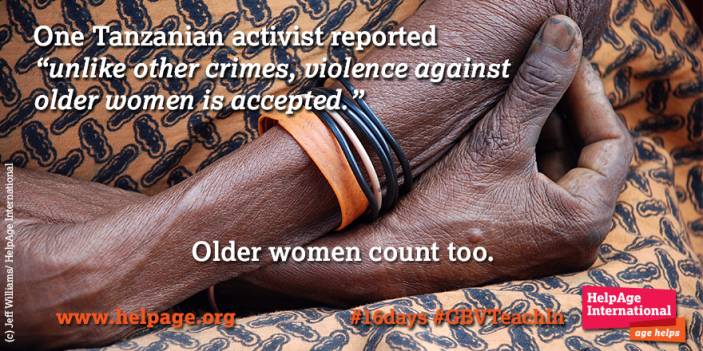The 16 Days Campaign runs 25 November – the Day for the Elimination of Violence against Women and Girl – to 10 December – Human Rights Day.
It invites NGOs, activists and the online community to explore gender-based violence and how it affects certain marginalised groups, including older women.

Today, people aged over 60 constitute 11% of the global population. By 2050, they will make up 22% – that amounts to almost 2 billion. Therefore looking at this large and growing group in relation to violence is extremely important to understand the full picture.
Despite these numbers, however, no one knows the prevalence of gender-based violence against older women in situations of displacement. In fact, no one even knows the prevalence of gender-based violence against people over 49.
Older refugees overlooked
Older refugees are often overlooked or not identified in data collection. In emergency settings, capacities are stretched and some actors lack expertise on ageing issues. Therefore risks and needs assessments in regards to violence and abuse very often focus on girls and younger women only.
Further magnifying older women’s risk to violence is the fact they are often excluded from, or unable to access services. Very little is known about gender-based violence against people over 49 as so few programmes include this population.
Even outside of humanitarian aid, this data is thin. The major data collection tool, the Demographic Health Surveys (DHS) was historically a family planning and maternal and child health-focused survey so was conducted with people between 15 and 49. DHS is the source of data for a number of global level indicators, including violence against women.
Older women in DRC
One of the few studies inclusive of older women in situations of protracted displacement was conducted in Eastern Democratic Republic of Congo. It found that over 15% of the people seeking health services for sexual violence were over 55 and women over 49 experienced rates of sexual violence on par with the rest of the population [1].
Older women represent less than 10% of the overall population in DRC, showing just how vulnerable this group is. This data was collected from patients at a hospital in the Democratic Republic of Congo. The study didn’t include men, and suffers from the weakness that very few of those experiencing violence seek treatment.
Community-based health programmes often exclude older people due to their inability to pay for services, medicines or supplies. Poor health is a potential outcome of violence. Those without access to health services who are also facing violence may be at particular risk.
Data is needed to prevent violence against older women
What anecdotal data on gender-based violence against older people that does exist, shows that older people are not being considered. Gender-based violence prevention and response programmes cannot be properly designed if they do not have baseline data. In many situations, documented cases of rape of older women are more common than public perception [2].
Two reports recount that older women who were sent out of camps in Darfur for firewood were raped [3]. Older women in Bangladesh flood shelters also reported being raped. In Dadaab, some older people have reported verbal, physical, sexual abuse in the camps.
A World Health Organization prevalence survey on elder abuse in Europe found that over 1 million older people faced sexual abuse in the previous year [4].
The WHO survey was not conducted in the highly-traumatic and stressful conditions that those in protracted displacement may often find themselves. At least these surveys are doing what’s required for an informed response.
Assumptions about the care offered to older people, combined with the exclusion from official surveys create an environment in which serious abuses – such as rape and gender-based violence – go unseen and unchallenged.
In an interview, one Tanzanian activist reported that “unlike other crimes, violence against older women is not just tolerated, but accepted.” [5]
Family members are often responsible for violence
Research carried out by HelpAge and the London School of Economics indicated that the majority of perpetrators of almost all forms of violence against both older women and men were family members (this sometimes included current partner or spouse) [6].
As well as acknowledging violence against groups based on race, sexuality and more, let’s remember older women who have often endured a lifetime of gender-based violence.
In our focus on impartiality, protecting all women in emergencies is a requirement for humanitarian principles based responses.
Join our Twitter Teach in on gender-based violence by following @helpage and the hashtags #16days #GBVTeachin.
Find out more about our work with older women and in emergencies.
References
[1] Harvard Humanitarian Initiative and Oxfam International, “Now, the world is without me”: An investigation of sexual violence in Eastern Democratic Republic of Congo, Cambridge MA and Oxford, 2010, p. 9.
[2] Natasha Efimov, Elder Abuse in Kyrgyzstan: A Summary of the Elder Abuse Survey, p. 13. www.helpage.org/silo/files/elder-abuse-in-kyrgyzstan-summary-of-the-elder-abuse-survey.pdf
[3] IASC, HelpAge International, Strong and Fragile: Learning from Older People in Emergencies, 2007; HelpAge International, Older People in Africa: a Forgotten Generation, 2008.
[4] European Report on Elder Maltreatment, p. viii, (2011). http://www.euro.who.int/__data/assets/pdf_file/0010/144676/e95110.pdf
[5] HelpAge International, No Country for Old Women, http://www.helpage.org/newsroom/features/no-country-for-old-women/?keywords=no+country+for+old+women
[6] CASE, HelpAge International, Developing an indicator-based framework for monitoring older people’s human rights: key findings for Peru, Mozambique and Kyrgyzstan http://sticerd.lse.ac.uk/dps/case/cr/casereport78.pdf
